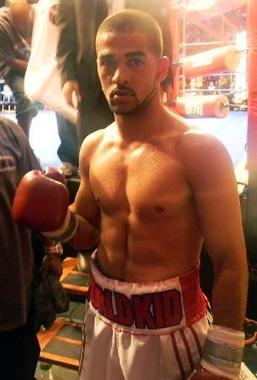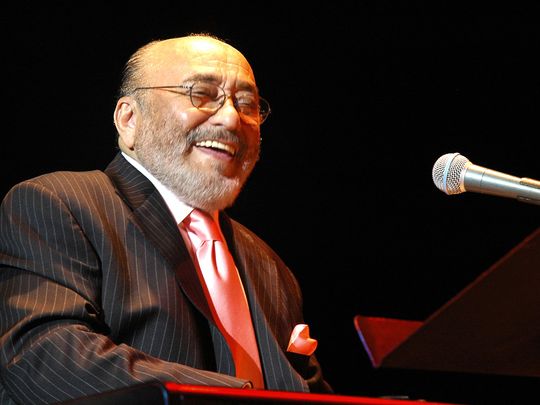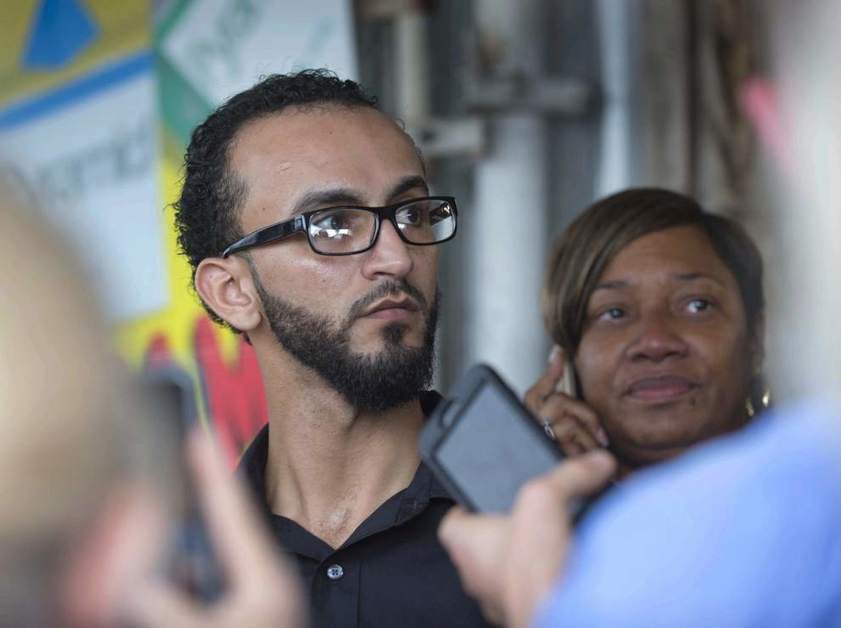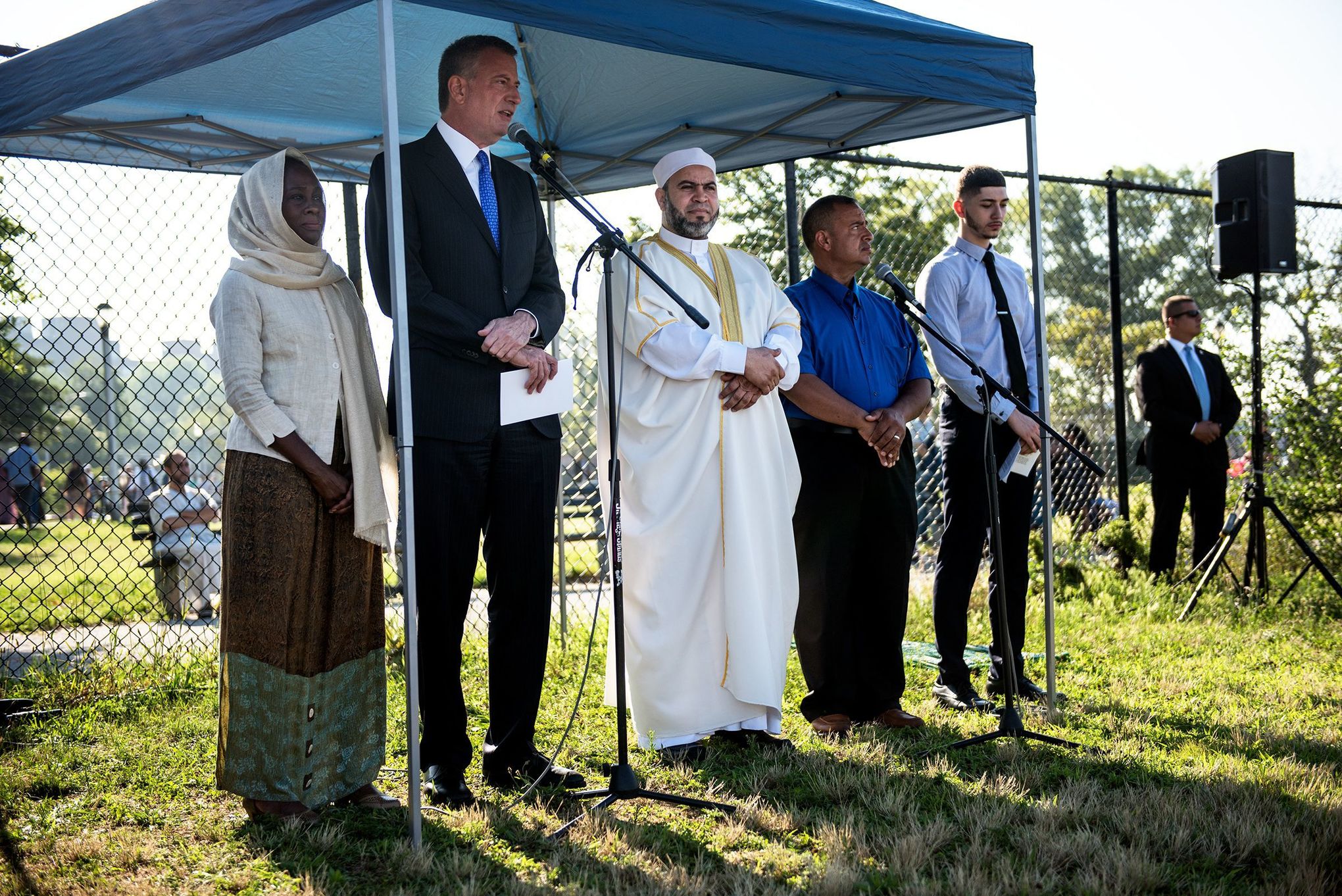
By Andrea Blum
Press and Guide
Olympic boxer Sadam Ali is one of 10 prominent Arab Americans being immortalized in a permanent exhibit at the Arab American National Museum. Photo courtesy of AANM
A world-renowned engineer, a comic book icon and an Olympic boxer are among the 10 prominent Arab Americans being immortalized in a permanent exhibit at the Arab American National Museum.
The innovators are being recognized for their ambition, talent and vision with spots in the “Making an Impact” exhibit, which pays tribute to Arab Americans who have made lasting impacts in their field and forged enduring legacies by influencing people on a global scale.
To close its 10th anniversary year, the museum welcomed the 10 new members to the permanent display.
A highly interactive gallery that tells the story of hundreds of Arab Americans and organizations, “Making an Impact” opened in 2005 and since has inducted everyone from activists, physicians and politicians to athletes, entertainers and labor leaders.
Within the exhibit, visitors can see multimedia displays as well as a plethora of artifacts signifying each member’s achievements.
Palestinian American comedian and actress Maysoon Zayid visited the museum May 7 as she officially became a part of the “Making an Impact” exhibit. Her visit included a night of two comedy performances in the museum’s Aliya Hassan Auditorium, where more than 200 guests enjoyed an evening of laughter.
The 2016 inductees also feature Egyptian American engineer Rana El Kaliouby, Palestinian American comedian and politician Dean Obeidallah, Egyptian American designer Karim Rashid, Syrian American hip-hop artist Omar Offendum, Jordanian American poet Suheir Hammad, Lebanese American DC Entertainment chief creative officer Geoff Johns, Yemini American boxer Sadam Ali, Syrian American National Hockey League All-Star Brandon Saad and Sudanese American activist Dr. Nawal Nour.
“It’s important to recognize the significant contributions Arab Americans have made throughout the past century that have resonated across so many different industries,” AANM Director Devon Akmon said. “Many of the recent ‘Making an Impact’ inductees are young and still very active. Being inducted at this point in their lives speaks volumes to the hard work and innovativeness of these individuals. There is so much potential and endless possibilities for what the future holds.”
Since 2005, the “Making an Impact” exhibit has spotlighted world-renowned surgeon Dr. Michael DeBakey, consumer advocate and presidential candidate Ralph Nader, White House journalist Helen Thomas, Indy Car racing legend Bobby Rahal, celebrated woodworker Sam Maloof, multiplatinum recording artist Paula Abdul and Professional Football Hall of Famer Bill George among others.
The exhibit is free to view with museum admission. The Arab American National Museum is at 13624 Michigan Ave., Dearborn.
The 2016 Making an Impact inductees are:
Sadam Ali (sports)
At age 8, Yemeni American Sadam Ali was inspired to start boxing by Yemeni British boxer “Prince” Naseem Hamed. When he was 17, Ali won the featherweight division of the 2006 National Golden Gloves Championship and a year later won the lightweight division. He represented Team USA at the 2008 Summer Olympics in Beijing. As a professional in the welterweight division, Ali remained undefeated for the first six years of his career.
Suheir Hammad (creative arts)
Born in Amman, Jordan, as a Palestinian refugee, Suheir Hammad’s poetry and writing often focus on the struggles of fitting in as an immigrant and as a woman in a sexist society. She has won several accolades over the years, including a Tony Award for Special Theatrical Event as a writer and performer for “Russell Simmons Presents Def Poetry Jam” on Broadway. Her poem “First Writing Since” gave voice to Arab Americans following the Sept. 11, 2001, attacks. In 2009, she received the George Ellenbogen Poetry Award from the Arab American Book Awards for her poem “Breaking Points.”
Geoff Johns (creative arts)
Growing up in Grosse Pointe, Johns’ interest in comics began when he found a stash of them in his grandmother’s attic. He wrote dozens of books for iconic characters including Superman, The Flash and Aquaman. As chief creative officer of DC Entertainment, Johns created the first Arab American superhero, Simon Baz. Introduced as a Dearborn native, the character became a new Green Lantern in 2012. Johns has since expanded DC’s reach into film and television. In 2012, AANM’s Russell J. Ebeid Library & Resource Center established a graphic novel collection in his honor.
Rana El Kaliouby (science)
Rana El Kaliouby pioneered emotion-recognition technology with her app Affectiva. Her interest started while working on her doctorate at Cambridge University. Away from her family and friends in Egypt, El Kaliouby wished her computer could better convey her emotional state. Her technology accurately reads minute changes in facial expressions that convey emotions. El Kaliouby worked as a research scientist at Massachusetts Institute of Technology and is a member of the Women in Engineering Hall of Fame.
Dr. Nawal Nour (activism)
Born to a Sudanese father and an American mother, Dr. Nawal Nour created the African Women’s Health Practice at Brigham and Women’s Hospital in Boston. The Harvard-affiliated facility provides services to immigrant women affected by female genital cutting — a harmful practice Nour dedicated her obstetrics career to ending. In 2003, she received a MacArthur “genius grant” in recognition of her work.
Dean Obeidallah (entertainment)
Born in New Jersey to a Palestinian father and an Italian mother, Dean Obeidallah created a career as a comedian and political satirist. Obeidallah was featured in the Axis of Evil Comedy Tour and co-founded the annual New York Arab American Comedy Festival with fellow “Making an Impact” inductee Maysoon Zayid. In 2013, he co-directed and co-produced the award-winning documentary “The Muslims are Coming!” with comedian and filmmaker Negin Farsad.
Omar Offendum (entertainment)
Hip-hop artist, poet, designer and activist Omar Offendum’s music frequently speaks to events in the Arab World, including several songs that went viral during the 2011 Arab Spring uprisings. His collaborators include hip-hop artists The Phillistines, Mr. Tibbz and The Narcicyst. Born in Saudi Arabia to Syrian parents, Offendum has raised money for various humanitarian relief organizations through his performances.
Karim Rashid (creative arts)
“Time” magazine once called Karim Rashid “the Poet of Plastic” and “the most famous industrial designer in all the Americas.” Born in Cairo and raised in Canada before moving to the U.S., Rashid has designed for many products and brands, including luxury goods, furniture, lighting and even a New York City manhole cover. His work is in museum collections including the Museum of Modern Art in New York City, Centre Georges Pompidou in Paris and the San Francisco Museum of Modern Art.
Brandon Saad (sports)
Brandon Saad is one of the few Arab Americans to play in the National Hockey League. He grew up playing hockey in Pittsburgh and after high school he quickly advanced through the amateur ranks. At 18, he was drafted to play with the Chicago Blackhawks in 2011. As a Blackhawk, Saad won two Stanley Cups in 2013 and 2015. He started playing for the Columbus Blue Jackets during the 2015-16 season and made his first NHL All-Star Game appearance.
Maysoon Zayid (entertainment)
Maysoon Zayid once described herself as “a Palestinian Muslim virgin with cerebral palsy from New Jersey, who is an actress, comedian and activist.” Zayid’s acting career began on the long-running soap opera “As the World Turns.” She appeared in Adam Sandler’s “You Don’t Mess With the Zohan,” and in 2003, she co-founded the New York Arab American Comedy Festival with Dean Obeidallah.
Source: www.pressandguide.com






